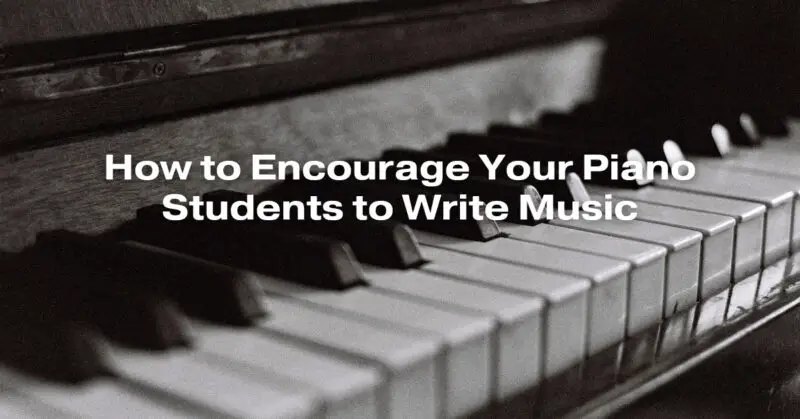As a piano teacher, nurturing creativity in your students is a rewarding endeavor. One way to spark their artistic expression and deepen their understanding of music is to encourage them to write their own compositions. “How to Encourage Your Piano Students to Write Music” is your guide to fostering the composer within each student. From beginners to advanced pianists, this guide provides strategies, resources, and inspiration to help your students embark on their journey as budding composers.
1. Cultivating a Creative Environment
- Creating a Safe Space: Establish a supportive and encouraging atmosphere in your piano studio.
- Inspiration Through Listening: Introduce your students to diverse styles and genres of music to ignite their creativity.
2. The Basics of Music Theory
- Understanding Musical Elements: Teach fundamental music theory concepts such as melody, harmony, rhythm, and form.
- Exploring Scales and Chords: Help your students grasp the basics of scales and chords to use as building blocks for composition.
3. The Art of Melody
- Crafting Memorable Melodies: Guide your students in creating captivating and memorable tunes.
- Melodic Development: Explore techniques to help students expand and refine their melodies.
4. Harmony and Chords
- Harmonizing Melodies: Teach the principles of harmonization and chord progressions.
- Chord Inversions: Introduce the concept of chord inversions to add depth to compositions.
5. Rhythmic Innovation
- Rhythmic Creativity: Encourage experimentation with rhythmic patterns and time signatures.
6. Form and Structure
- Understanding Musical Form: Explore various musical forms and their role in composition.
- Mapping Out a Composition: Guide your students in structuring their compositions effectively.
7. Technology and Composition
- Digital Tools: Introduce digital composition software and apps to enhance the composing experience.
8. The Creative Process
- Exploration and Experimentation: Encourage students to explore different musical ideas and take risks.
- Keeping a Composition Journal: Promote the habit of keeping a composition journal to capture ideas and progress.
9. Showcasing and Celebrating Compositions
- Performance Opportunities: Arrange recitals or events where students can perform their compositions.
10. The Role of Feedback
- Constructive Criticism: Teach your students how to provide and receive constructive feedback.
11. Resources for Young Composers
- Composer Workshops: Explore workshops and programs that support young composers.
Conclusion
“How to Encourage Your Piano Students to Write Music” is an invitation to unlock the creative potential of your piano students. By providing the tools, guidance, and inspiration to compose their own music, you empower them to become not just pianists but true artists who contribute their unique voices to the world of music. Through this journey of self-expression, your students will discover the joy of creating music that is entirely their own.


